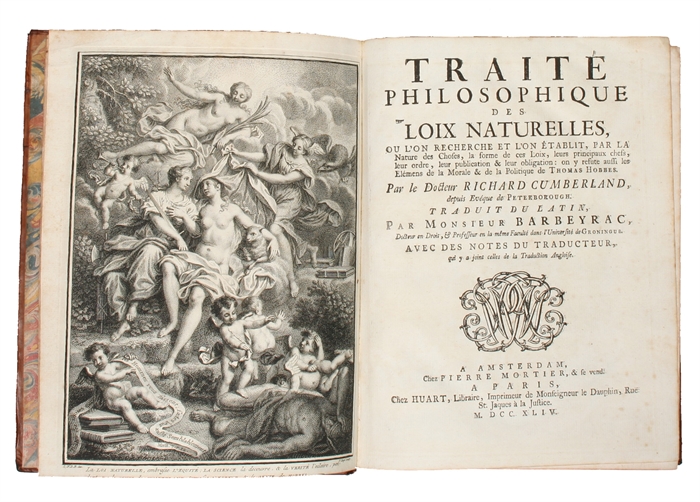A MAIN ATTACK ON HOBBES IN FRENCH
CUMBERLAND, RICHARD.
Traité Philosophique des Loix Naturelles, ou l'on recherche et l'on établit, par la Nature des Choses, la forme de ces Loix, leurs principaux chefs, leur ordre, leur publication & leur obligation: on y refute aussi les Elemens de la Morale & de la Politique de Thomas Hobbes. Tradut du Latin, Par Monsieur Barbeyrac, avec des Notes du Traducteur, qui y a joint celles de la Traduction Angloise.
Amsterdam, Chez Pierre Mortier & Paris, Chez Huart, 1744. 4to. Beautiful cont. full mottled calf with five raised bands and gilt red title-label to richly gilt back. All edges of boards gilt. A very beautiful and well preserved copy with only minor fowing to a few leaves. Half-title, beautiful engraved frontispiece (a bit ahaved at bottom, where half of the last line of text is cut away - thus not disturbing image, and all text still legible), XXVIII, (1), 435, (1, -errata), (8, -contents) pp.
First edition of the important first French translation of Cumberland's magnum opus, the highly important and influential masterpiece, which not only criticized Hobbes, absorbing and neutralizing many of his insights, but which thus also created a new political and ethical theory, which came to greatly influence later jurists and philosophers of natural law and ethics, e.g. Locke, Pufendorf, Hutcheson, and Shaftesbury, as well as much philosophy of the French Enlightenment. The present work also greatly influenced the understanding and reception of Hobbes in France and affected the French Enlightenment philosophers.
"Traité Philosophique des Loix Naturelles", originally published in Latin in 1672, the same year as Pufendorf's "De jure naturae et gentium", constitutes Cumberland's earliest work, published by him at the age of 40. It was immediately read by the greatest of his contemporaries, exercised a great influence and was soon regarded as one of the three greatest works of the modern natural law tradition, together with Grotius' "On the Law of War and Peace" and Pufendorf's "De jurae naturae". In a later work Pufendorf commended the "De legibus" highly, and with its early utilitarian views and its doctrine of the common good as the supreme law of morality, it anticipated and influenced the direction that much ethical thought was to take in the 18th century.
"Some of the earliest utilitarian thinkers were the 'theological' utilitarians such as Richard Cumberland (1631-1718) and John Gay (1699-1745). They believed that promoting human happiness was incumbent on us since it was approved by God." (SEP).
"His combination of a strong critique of innate ideas and assertion of the moral community with God was a contributing factor in the formation of the kind of empirically based natural providentialism, or natural religious teleology, which soon became the framework or natural law thinking and, indeed, for the mainstream of Enlightenment moral thought." (Haakonssen, Natural Law and Moral Philosophy", p. 51).
At the age of 60, the English philosopher and theologian Richard Cumberland (1631 - 1718) was appointed bishop of Peterborough (without having applied for it). Before that, he had been educated at Magdalen College in Cambridge and at the University of Oxford. He studied medicine for some time and then theology, becoming Doctor of Divinity in 1680. In 1658 he became rector of Brampton Ash in Northamptonshire, and in 1661 he became one of the 12 preachers of the university. In 1670 he became rector of All Saints at Stamford. He was known for the great effort and time that he put into his work, and it was not until his late thirties that he found time to finish the major work that he had been working on. Thus in 1672, he published his first work, his magnum opus "De legibus naturae"( "Traité Philosophique des Loix Naturelles"), which became famous for its vast critique of Hobbes - mainly of that which he saw as his egoistic ethics- and for its propounding of utilitarianism.
The main purpose of the "De legis naturae" is to refute Hobbes' theories of the constitution of man, morality, origin of society, etc. and to show that the state of nature is not a state of war. According to Cumberland, man's primary end is not self-advantage, and power is not the foundation of society. He puts forth a new doctrine of morality, which is still based on natural law, but which is accompanied by a running criticism of Hobbes' views, which seem to him subversive of religion, morality, and civil society. He sees the law of nature as capable of pointing out that which will promote the common good, and he believes that the law of nature can be inferred by observing physical and mental phenomena. Thus, Cumberland agrees with Hobbes in the attempt to provide a naturalistic account of the normative force of obligation and in the attempt of establishing a rational dictate, but he opposes Hobbes in the way that these can be derived.
Another edition of the present work was published simultaneously at Lausanne and Geneva, and it was published again in 1757 in Leyden. The first English translation of the work appeared in 1727, and a new translation into English followed in 1750.
Brunet II:442 (only mentioning the present Amsterdam-edition and the 1757 Leyden-edition).
Order-nr.: 39547


